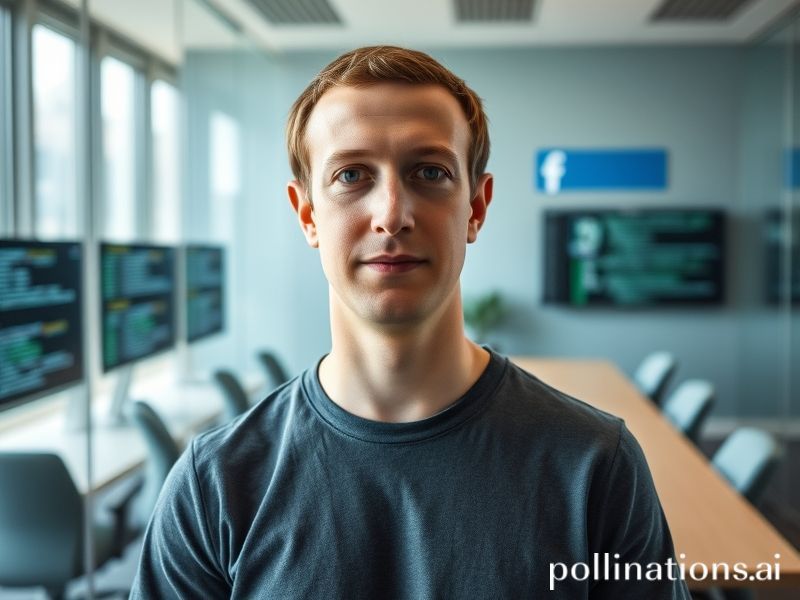The Accidental Emperor: How Mark Zuckerberg Became the World’s Most Reluctant Geopolitical Force
Mark Zuckerberg, the man who once promised to “move fast and break things,” has finally succeeded—mostly in breaking trust, attention spans, and the occasional democracy. From his glass-walled command center in Menlo Park, the 39-year-old emperor of the Meta empire surveys a world that has learned to love and loathe him in equal measure, a neat trick previously reserved for tax collectors and late-night karaoke singers.
Internationally, Zuckerberg is no longer merely a tech mogul; he’s a geopolitical weather system. When Facebook tweaked its News Feed algorithm in 2018, Filipino midwives in Quezon City saw their pregnancy-meme groups vanish; when WhatsApp limited message forwarding to curb lynch mobs in Uttar Pradesh, Indian aunties simply pivoted to Telegram, proving that panic, like water, finds its own level. The European Union has fined Meta so many times that Brussels accountants now budget for it the way American farmers budget for drought: inevitable, cyclical, and best met with grim resignation. Meanwhile, in Nigeria, young entrepreneurs run entire e-commerce empires inside Instagram DMs, a testament to human adaptability—and to the fact that a platform originally designed to rate Harvard classmates’ hotness has become sub-Saharan Africa’s informal stock exchange.
Zuckerberg’s latest pivot to the “metaverse” lands differently abroad than it does in the U.S. headset market. In South Korea, where the government already administers digital avatars for civil servants, the idea of spending Tuesday afternoon as a legless cartoon in a virtual conference room feels less dystopian and more like an overdue software update. In Brazil, however, the metaverse is viewed with the suspicion reserved for anything that distracts from Carnival, soccer, and the more pressing task of not being robbed at gunpoint. German regulators, ever the life of the party, have declared that if the metaverse processes EU citizens’ eye-tracking data, it will be regulated like a nuclear reactor—because nothing says “fun” like enriched plutonium and biometric consent forms.
The darker joke is that Zuckerberg’s greatest export isn’t software but anxiety. From Myanmar to Sri Lanka, Facebook posts have greased the skids toward ethnic violence, prompting the UN to accuse the platform of contributing to genocide with the same clinical tone it once reserved for arms dealers. In response, Meta hired more content moderators than the British Empire ever hired colonial officers, then paid them in trauma counseling and free bananas. The moderators, mostly outsourced to Nairobi and Manila, spend their days staring into humanity’s id, a job description that would make Hieronymus Bosch update his LinkedIn.
Yet Zuckerberg remains the world’s most reluctant sovereign. He speaks earnestly about “community” while monetizing outrage at planetary scale, a contradiction smoother than any diplomatic double-speak. When pressed about hate speech in Delhi or vaccine misinformation in Caracas, he defaults to the passive voice: “mistakes were made,” “systems need improvement,” as if the algorithm were a rogue Roomba chewing the furniture rather than code written by well-paid engineers who know exactly what engagement optimization means in Gujarati.
The broader significance? We have collectively granted a hoodie-clad billionaire the powers once reserved for emperors and cable-TV monopolies, minus the toga or the FCC oversight. Nation-states scramble to erect digital borders—India’s data-localization laws, Vietnam’s cybersecurity decrees, Russia’s VPN bans—but the borders leak like a Soviet submarine. In this new world order, sovereignty is measured less in tanks than in terabytes, and Zuckerberg, arms wide in his avatar’s digital living room, is the accidental emperor of the exabyte age.
One day historians may puzzle over how a Harvard sophomore with a penchant for classical Latin and flip-flops became the de-facto foreign minister of 3 billion souls. Until then, we refresh, we scroll, we consent to cookies like good little digital serfs—because opting out is now the modern equivalent of choosing to live in a cave. And the cave, of course, has no Wi-Fi.







